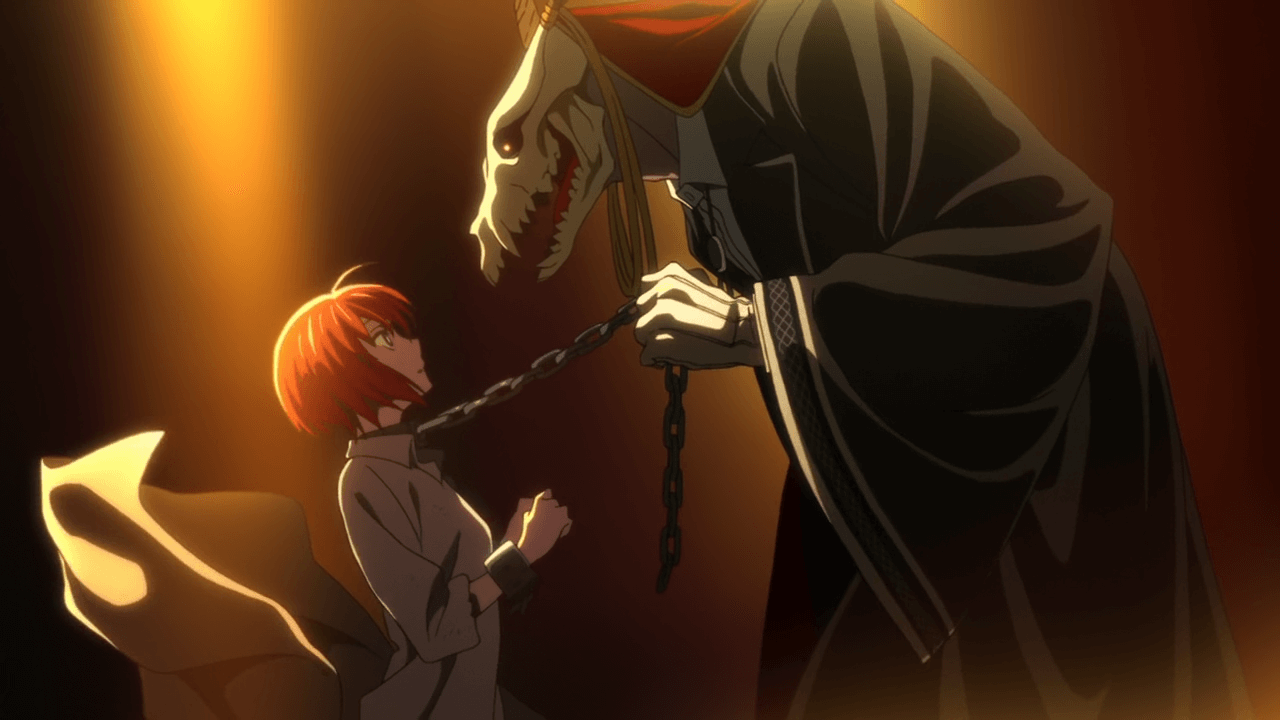When I first started watching The Ancient Magus’ Bride on Crunchyroll, I was struck by how it began. Here was a protagonist so far in the depths of despair that she seemingly sold herself in auction to whoever might have her, reasoning that at least someone in this world would want her, and coming to the conclusion that whatever might happen, it would be a marginally better alternative to suicide.
This setup exists in the manga as well, to the extent that some fans call it “Stockholm Syndrome: the series.” The protagonist is bought at auction by Elias the powerful mage, he takes her to his house calling her his bride, and so begins the series. I could see this critique: for the first several episodes, Elias occasionally remarks to be careful, that he owns her. Chise, the viewpoint character, seems to have no sense of self-worth and constantly demeans herself and her actions.
It was not just other women who voiced this concern: there were men too, who viewed the dynamic between Elias and Chise as abusive. It reminded them of Beauty and the Beast, they said: the captive rationalizes the abuse, and falls in love with her captor. They did not want to see it past the first couple of episodes, male and female alike.
And yet, it still seemed to me Chise had agency. She was in the depths of severe depression and was considering suicide. The animation did not show her full story right away, but we saw her contemplating suicide from a school rooftop before making the eventual choice to take buyers on their offer: in the manga, and as details of Chise’s life in the anime slowly are revealed, we saw that not only had her magical status brought her abandonment and despair up to that point, but we saw Chise making a bargain with the auctioneers. In fact, in the story, she pocketed half her selling price, which came to 2.5 million pound sterling. While yes, she was acting out of self-destruction, she retained some degree of agency in doing so. More to the point, the series asked for the viewers to at least have some empathy with Chise in this: viewers did not need to support her self-destructive decisions, but were asked to try and understand what may have led Chise to believe that it was the only option left to her.
When I first started writing this article, I was interested in the similarities to stories of Beauty and the Beast partly because stories of Beauty and tests of merit are a feature in many Western fairy tales. In The Ancient Magus’ Bride, while Chise Hatori is the protagonist and said to be a statistically unlikely redheaded Japanese girl, the flavor of the series undeniably uses Western (particularly British) fairy and magic lore. There are church grims as well as Titania as the Queen of the Fairies, in addition to tropes about the fairies and spirits themselves, their different types and the ways people speak about them. But again, where some saw more similarities in the dynamic between Chise and Elias being abusive, I started to see something else.
The Ancient Magus’ Bride does concentrate on Chise and Elias, but it is Chise’s story. As such, part of the story quickly goes to her learning English and understanding the world around her: both the vaguely Welsh and English world of humans, and the fantastical blending of the world of the fairies that exists sideways to it. Acquaintances she meets are not always friendly to her at the outset, but the ones that are familiar with Elias often try to nudge Chise to a position of having friends and acting more independently, so she is not as self-destructive and not as dependent on Elias to move in her new world. Unlike the fairy tales, which have Beauty and the Beast living in apparent happiness and everyone around them thinking everything is okay, there is recognition in this story that everything does not start off okay. Just as Chise has much to learn and grow from, Elias is also immature and exceptionally self-centered. As Chise grows and becomes more powerful in magic, as well as making connections of her own, she even gains the confidence and anger to call Elias out on his behavior after realizing he was willing to kill an innocent over jealousy later in the series. And with the story surrounding the series antagonist, the viewer is asked to realize distinctions between the abhorrent, self-centered behavior of the series antagonist and Elias Ainsworth are not as clear as they might seem. This is especially true in the anime series, which wrote an ending to the story already – one where Chise looks forward to a life as long as any other, albeit one empowered by magic, the connections she has made, and her new sense of boundaries. There is hope to her yet.
